Masters of Cinema Blu-ray Review: Metropolis
"The definitive edition of a cinematic milestone"
Courtesy of Eureka Entertainment and their Masters of Cinema series is the British re-release of the seminal sci-fi classic
Metropolis, restored to a running time of 148 minutes thanks to a find of a near complete version of the original cut of the film in Buenos Aires. Only 4000 copies of the Steelbook version will be released Worldwide.
In the future there is the great city of Metropolis, a paradise for the wealthy who have the beautiful Eternal Garden, train in sports and attend lectures. But the workers have to toil long tiring days in hazardous condition and live underground. The workers are on the edge of revolting, but their leader Maria (Brigitte Helm) promises to them the Mediator is coming, the person who would unite the Bourgeoisie and the Proletariat. One day Freder (Gustav Fröhlich) the son of the master and founder of the city, Jol Fredersen (Alfred Abel) sees Maria and seeks to find her in the worker districts, discovering the hardships the workers endure.
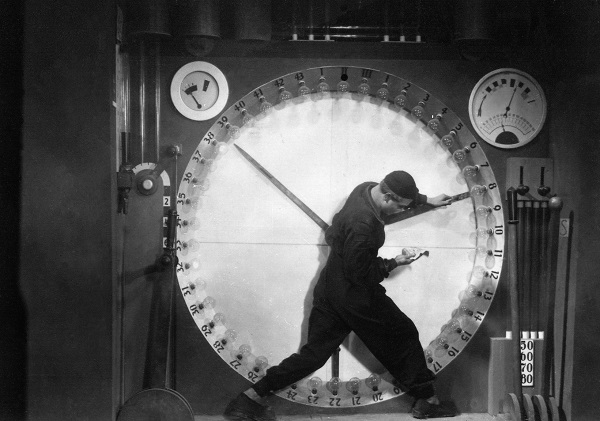
Jol Fredersen seeks to prevent a rebellion and needs to kill the workers' ideas. He unites with scientist and inventor Rotwang (Rudolf Klein-Rogge) to replace Maria with his newly created robot and justify using force. But Rotwang is a man with his own agenda.
Metropolis deserves its status as a silent film classic and this restored version is properly going to be the closest we are going to get to Fritz Lang's intended vision.
Metropolis is a thematically and technical masterpiece, being the most expensive movie made at the time and was made at a time where Germany suffered political instability and economic turmoil, but also a period where the Weimar Republic was one of the most artistic places in the world.
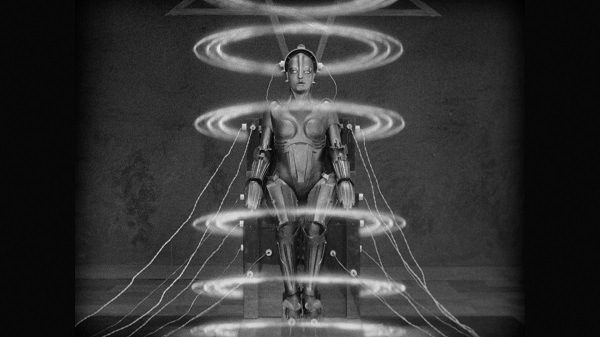
There are two key theme areas in
Metropolis, class struggle/economics and religion. Just from a basic synopsis of
Metropolis you know class struggle is going to be front and center of its story. There are themes about the economic inequality between the rich and poor, the owners and the workers and that workers build up the city, keep it going and yet receive no share in the society. There are themes about the gruelling working conditions and long hours they have to work in very physical jobs. There are disasters that cost lives and causes injuries yet the work must go on. Though the workers are on the edge of rebelling the character of Maria advocates a peaceful solution, a way that could benefit both classes as she says men of all classes are equal.
The religious themes are also very overt throughout the movie. There are plenty of religious phrases and iconography, the tower in the city of Metropolis is called the Tower of Babel, going high up into the sky and looks like the painting of the same name by Pieter Bruegel, The Elder, a construction bursting into the heavens. Maria retells the story of the construction of The Tower of Babel and along with the fantasy sequence near the beginning uses Old Testament style imagery, slaves have to pull massive blocks or being pushed up stairs. The idea of the Mediator who will unite society is basically the Messiah for their world.
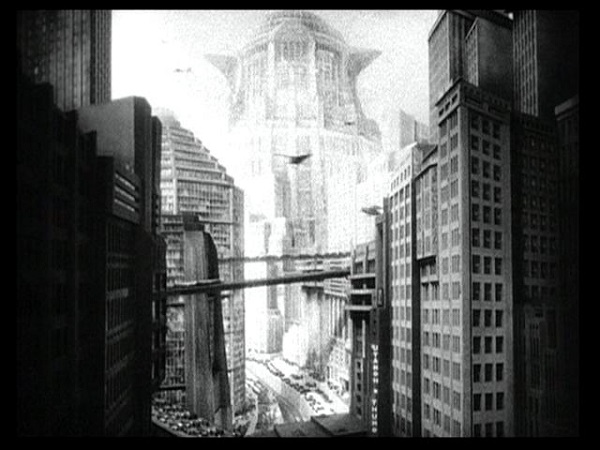
When Maria makes her speech to the workers she is surrounded by crosses and when she perches, most of the workers overwrought with emotions, similar to coal miners and workers during John Wesley's open air sermons near Bristol in the early 18th century. The fake Maria in contrast is the Whore of Babylon, corrupting everyone who comes across her: the rich fall into sin and hedonism as they party their way to oblivion and the poor thrown rational thought out the window as they are goaded to the folly of revolution.
The character of Rotwang also plays into this theme, a mad scientist archetype who wants to play god, create life with his machine-man and resurrect the dead. The art-direction for his laboratory served as a model for succeeding sci-fi movies, with electrical equipment buzzing and chemicals bubbling all around.
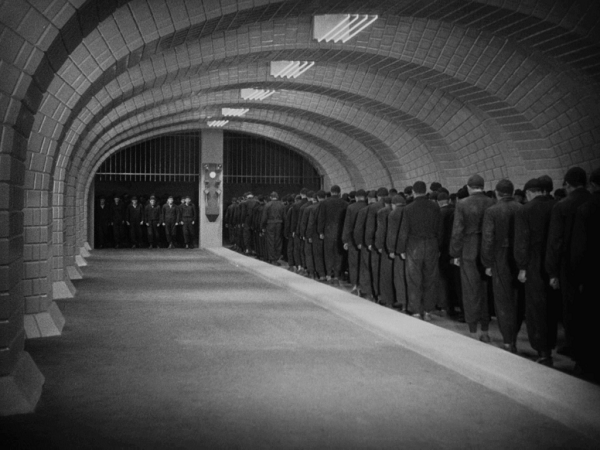 Metropolis
Metropolis was a technical marvel back when it was first released and many of the effects still hold up today. It is the scale of the movie that is something to behold, using lots of models and matte paintings to show cityscape, some of the most iconic images in the silent film era. There was great work put into the flooding sequences as models are used to show destruction and it was a movie that used 37,000 extras, truly adding weight to the revolution scenes. There are plenty of camera and editing tricks used as well, for party scenes and the transformation of the machine into Fake Maria.
Due to the fact this movie is a restoration based on lost film footage there are noticeable drops in quality at some points, adding lost clips to sequences. The big additions to the resorted version are the recovery of two scenes, Georgy's (Erwin Biswanger) wild night out and the confrontation between Josaphat (Theodor Loos) and The Thin Man (Fritz Rasp). The only scene that is lost is the fight between Joh and Rotwang, which is still left as a title card.
Being a silent film the acting for
Metropolis relied on exaggerated body language and facial expressions. Brigitte Helm serves as the best example of this as she plays two roles, the angelic Maria with big, wide eyes and the evil doppelganger halfway closing her left eye and having more expansive body movements. Alfred Abel is the most reserved as the master of the city.
Metropolis is an essential movie for anyone who considers themselves a cinephile or a sci-fi fan. It a film that works as a thematic piece of dystopia fiction or simply as a grand sci-fi spectacle.
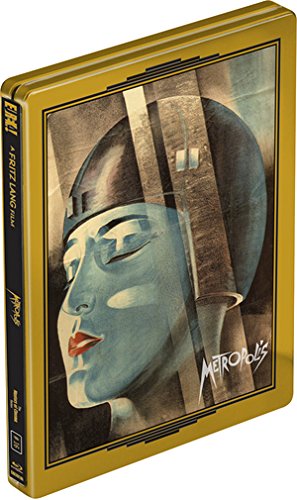 Special Features
Special Features
Along with the film itself is a commentary from film historian David Kalat and film critic Jonathan Rosenbaum. As well as the restored version of
Metropolis the Blu-ray also comes with the controversial 1984 version by producer Giorgio Moroder who used a pop soundtrack instead of the iconic score.
The Blu-ray features three documentaries,
Die Reise nach Metropolis,
Metropolis Refound and
The Fading Image.
Die Reise nach Metropolis is a 53 minute long documentary serving as an overview of
Metropolis' pre-production, filming, early attempts at resorting the film and making of the 2010 version: fascinating viewing for film buffs.
Metropolis Refound is a more precise documentary focusing on the Buenos Aires and
Metropolis journey in Argentina.
The Fading Image is a short documentary about Giorgio Moroder's restoration of the movie.
The Blu-ray will also come with a 56-page booklet but was unavailable for the press screening copy.
Pros
- The themes of religion and class
- The restored scenes
- The classic art-direction and special effects
- An iconic score
- Documentaries for people interested in filmmaking
- The Giorgio Moroder version which you can play compare and constract
Cons
- Only things out of the restorers control
 Jol Fredersen seeks to prevent a rebellion and needs to kill the workers' ideas. He unites with scientist and inventor Rotwang (Rudolf Klein-Rogge) to replace Maria with his newly created robot and justify using force. But Rotwang is a man with his own agenda.
Metropolis deserves its status as a silent film classic and this restored version is properly going to be the closest we are going to get to Fritz Lang's intended vision. Metropolis is a thematically and technical masterpiece, being the most expensive movie made at the time and was made at a time where Germany suffered political instability and economic turmoil, but also a period where the Weimar Republic was one of the most artistic places in the world.
Jol Fredersen seeks to prevent a rebellion and needs to kill the workers' ideas. He unites with scientist and inventor Rotwang (Rudolf Klein-Rogge) to replace Maria with his newly created robot and justify using force. But Rotwang is a man with his own agenda.
Metropolis deserves its status as a silent film classic and this restored version is properly going to be the closest we are going to get to Fritz Lang's intended vision. Metropolis is a thematically and technical masterpiece, being the most expensive movie made at the time and was made at a time where Germany suffered political instability and economic turmoil, but also a period where the Weimar Republic was one of the most artistic places in the world.
 There are two key theme areas in Metropolis, class struggle/economics and religion. Just from a basic synopsis of Metropolis you know class struggle is going to be front and center of its story. There are themes about the economic inequality between the rich and poor, the owners and the workers and that workers build up the city, keep it going and yet receive no share in the society. There are themes about the gruelling working conditions and long hours they have to work in very physical jobs. There are disasters that cost lives and causes injuries yet the work must go on. Though the workers are on the edge of rebelling the character of Maria advocates a peaceful solution, a way that could benefit both classes as she says men of all classes are equal.
The religious themes are also very overt throughout the movie. There are plenty of religious phrases and iconography, the tower in the city of Metropolis is called the Tower of Babel, going high up into the sky and looks like the painting of the same name by Pieter Bruegel, The Elder, a construction bursting into the heavens. Maria retells the story of the construction of The Tower of Babel and along with the fantasy sequence near the beginning uses Old Testament style imagery, slaves have to pull massive blocks or being pushed up stairs. The idea of the Mediator who will unite society is basically the Messiah for their world.
There are two key theme areas in Metropolis, class struggle/economics and religion. Just from a basic synopsis of Metropolis you know class struggle is going to be front and center of its story. There are themes about the economic inequality between the rich and poor, the owners and the workers and that workers build up the city, keep it going and yet receive no share in the society. There are themes about the gruelling working conditions and long hours they have to work in very physical jobs. There are disasters that cost lives and causes injuries yet the work must go on. Though the workers are on the edge of rebelling the character of Maria advocates a peaceful solution, a way that could benefit both classes as she says men of all classes are equal.
The religious themes are also very overt throughout the movie. There are plenty of religious phrases and iconography, the tower in the city of Metropolis is called the Tower of Babel, going high up into the sky and looks like the painting of the same name by Pieter Bruegel, The Elder, a construction bursting into the heavens. Maria retells the story of the construction of The Tower of Babel and along with the fantasy sequence near the beginning uses Old Testament style imagery, slaves have to pull massive blocks or being pushed up stairs. The idea of the Mediator who will unite society is basically the Messiah for their world.
 When Maria makes her speech to the workers she is surrounded by crosses and when she perches, most of the workers overwrought with emotions, similar to coal miners and workers during John Wesley's open air sermons near Bristol in the early 18th century. The fake Maria in contrast is the Whore of Babylon, corrupting everyone who comes across her: the rich fall into sin and hedonism as they party their way to oblivion and the poor thrown rational thought out the window as they are goaded to the folly of revolution.
The character of Rotwang also plays into this theme, a mad scientist archetype who wants to play god, create life with his machine-man and resurrect the dead. The art-direction for his laboratory served as a model for succeeding sci-fi movies, with electrical equipment buzzing and chemicals bubbling all around.
When Maria makes her speech to the workers she is surrounded by crosses and when she perches, most of the workers overwrought with emotions, similar to coal miners and workers during John Wesley's open air sermons near Bristol in the early 18th century. The fake Maria in contrast is the Whore of Babylon, corrupting everyone who comes across her: the rich fall into sin and hedonism as they party their way to oblivion and the poor thrown rational thought out the window as they are goaded to the folly of revolution.
The character of Rotwang also plays into this theme, a mad scientist archetype who wants to play god, create life with his machine-man and resurrect the dead. The art-direction for his laboratory served as a model for succeeding sci-fi movies, with electrical equipment buzzing and chemicals bubbling all around.
 Metropolis was a technical marvel back when it was first released and many of the effects still hold up today. It is the scale of the movie that is something to behold, using lots of models and matte paintings to show cityscape, some of the most iconic images in the silent film era. There was great work put into the flooding sequences as models are used to show destruction and it was a movie that used 37,000 extras, truly adding weight to the revolution scenes. There are plenty of camera and editing tricks used as well, for party scenes and the transformation of the machine into Fake Maria.
Due to the fact this movie is a restoration based on lost film footage there are noticeable drops in quality at some points, adding lost clips to sequences. The big additions to the resorted version are the recovery of two scenes, Georgy's (Erwin Biswanger) wild night out and the confrontation between Josaphat (Theodor Loos) and The Thin Man (Fritz Rasp). The only scene that is lost is the fight between Joh and Rotwang, which is still left as a title card.
Being a silent film the acting for Metropolis relied on exaggerated body language and facial expressions. Brigitte Helm serves as the best example of this as she plays two roles, the angelic Maria with big, wide eyes and the evil doppelganger halfway closing her left eye and having more expansive body movements. Alfred Abel is the most reserved as the master of the city.
Metropolis is an essential movie for anyone who considers themselves a cinephile or a sci-fi fan. It a film that works as a thematic piece of dystopia fiction or simply as a grand sci-fi spectacle.
Metropolis was a technical marvel back when it was first released and many of the effects still hold up today. It is the scale of the movie that is something to behold, using lots of models and matte paintings to show cityscape, some of the most iconic images in the silent film era. There was great work put into the flooding sequences as models are used to show destruction and it was a movie that used 37,000 extras, truly adding weight to the revolution scenes. There are plenty of camera and editing tricks used as well, for party scenes and the transformation of the machine into Fake Maria.
Due to the fact this movie is a restoration based on lost film footage there are noticeable drops in quality at some points, adding lost clips to sequences. The big additions to the resorted version are the recovery of two scenes, Georgy's (Erwin Biswanger) wild night out and the confrontation between Josaphat (Theodor Loos) and The Thin Man (Fritz Rasp). The only scene that is lost is the fight between Joh and Rotwang, which is still left as a title card.
Being a silent film the acting for Metropolis relied on exaggerated body language and facial expressions. Brigitte Helm serves as the best example of this as she plays two roles, the angelic Maria with big, wide eyes and the evil doppelganger halfway closing her left eye and having more expansive body movements. Alfred Abel is the most reserved as the master of the city.
Metropolis is an essential movie for anyone who considers themselves a cinephile or a sci-fi fan. It a film that works as a thematic piece of dystopia fiction or simply as a grand sci-fi spectacle.
 Special Features
Along with the film itself is a commentary from film historian David Kalat and film critic Jonathan Rosenbaum. As well as the restored version of Metropolis the Blu-ray also comes with the controversial 1984 version by producer Giorgio Moroder who used a pop soundtrack instead of the iconic score.
The Blu-ray features three documentaries, Die Reise nach Metropolis, Metropolis Refound and The Fading Image. Die Reise nach Metropolis is a 53 minute long documentary serving as an overview of Metropolis' pre-production, filming, early attempts at resorting the film and making of the 2010 version: fascinating viewing for film buffs. Metropolis Refound is a more precise documentary focusing on the Buenos Aires and Metropolis journey in Argentina. The Fading Image is a short documentary about Giorgio Moroder's restoration of the movie.
The Blu-ray will also come with a 56-page booklet but was unavailable for the press screening copy.
Special Features
Along with the film itself is a commentary from film historian David Kalat and film critic Jonathan Rosenbaum. As well as the restored version of Metropolis the Blu-ray also comes with the controversial 1984 version by producer Giorgio Moroder who used a pop soundtrack instead of the iconic score.
The Blu-ray features three documentaries, Die Reise nach Metropolis, Metropolis Refound and The Fading Image. Die Reise nach Metropolis is a 53 minute long documentary serving as an overview of Metropolis' pre-production, filming, early attempts at resorting the film and making of the 2010 version: fascinating viewing for film buffs. Metropolis Refound is a more precise documentary focusing on the Buenos Aires and Metropolis journey in Argentina. The Fading Image is a short documentary about Giorgio Moroder's restoration of the movie.
The Blu-ray will also come with a 56-page booklet but was unavailable for the press screening copy.